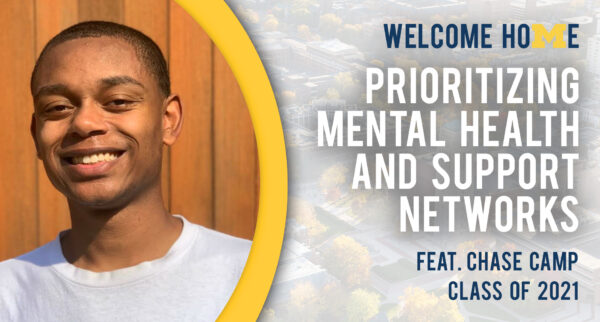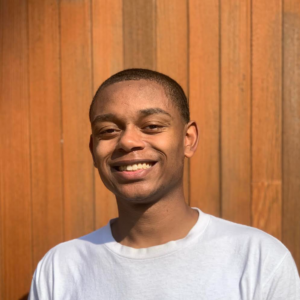University of Michigan senior Chase Camp explores addressing and promoting mental health on campus and within the community, and highlights the work of the Wolverine Support Network (WSN) where he serves as Director of Marketing and Outreach.
Interview conducted by Keara Kotten
#UMSocial Intern and University of Michigan Class of 2022
Q: Hey, Wolverines! I’m Keara and I have Chase with me today for the Welcome HoMe podcast series. So Chase, can you tell me a little bit about yourself and your role here on campus?
Hi, my name is Chase Camp and I’m from Southfield, Michigan, which is right outside Detroit. I’m going into my senior year and I’m majoring in economics. On campus, I’m the Director of Marketing and Outreach for the Wolverine Support Network [WSN], an organization dedicated to addressing and promoting mental health on campus and within the community.
Q: That’s awesome, Chase. Can you tell us about how you’re feeling to start off this semester: any concerns you have, things you’re excited about, or hopes?
I’m honestly not feeling amazing about the start of the school year, but I’m definitely going to try to make the best of it as my last year at Michigan. I was looking forward to having a football season, but I think they made the right decision to postpone the season. Online learning will definitely be a challenge, but I feel like the university is better prepared now to handle online classes compared to March and April. And I’ll still be able to interact with friends, study, and talk about classes.
Q: Since you had to adjust to online learning last semester, and will be doing a similar format this semester, are there any tools or strategies that you think will be helpful for you this fall?
I would definitely say having Zoom calls with friends and studying with them was helpful. Sometimes we would act like we were at the UgLi, which is definitely weird, but we got used to it and it made studying easier and more productive. I definitely consider myself a social person, so I feel like I do better studying with people. Even if we’re not always studying, overall I still do better studying with others.
Q: Could you tell us about Wolverine Support Network and the role it has at U-M?
Wolverine Support Network was founded as a way to de-stigmatize mental health on campus. It’s sponsored by CAPS [Counseling and Psychological Services], but a lot of what we do is on our own. It’s there to increase [mental health] conversations on campus and increase people’s mental well-being. We reach out to many different communities, so that they are aware of our efforts. There are a decent amount of resources on campus, but people might not always be aware.
It’s something that’s student run, which I think makes it more personable. We run groups with 10 to 12 people and two peer facilitators. They’re trained in QPR [Question, Persuade, and Refer], how to lead groups, and how to facilitate groups.
It’s really just a conversation with people you wouldn’t normally meet on campus. People can get advice or talk about whatever they want. They don’t even have to say anything; they can just listen. They can get stuff off their chest, or whatever it may be. It’s a way to, for an hour a week, de-stress and not really think about anything else except for what’s going on in that group. I’ve been a part of this since my freshman year and I absolutely love the organization.
Q: Have you been on both sides of it: being a member of the group and then also facilitating the group?
Yeah, I was a member my freshman year and first semester sophomore year. Then, second semester sophomore year I became a leader. I was a leader for three semesters and I absolutely loved doing that. Then, just this past March, I became the Director of Marketing and Outreach.
Q: For incoming freshmen, how do you plan on getting them to come to events or market it to them?
That’s a good question. We have been reaching out to the residence halls that the freshmen are in. We are going to be at virtual Festifall and try to get them on as many email lists and websites as we can. We are using our social media, so people can see it and know what [WSN] is.
Q: Do you have a particular story that you found really impactful with Wolverine Support Network that you can share?
Yeah, I can talk about my own story. When I was a freshman, I came on campus and, like I said before, I consider myself a really big extrovert. I find I can make friends pretty easily, but then I came to Michigan and it was very challenging. I didn’t really make a lot of friends freshman year. I joined WSN in the latter part of my first semester and I feel like I made some decent connections within my first group but especially in my second group. I still talk to the people from that group today. One of them is on the director team with me. Another, I talk to about sports all the time. Past that group as well, I’ve made good connections and good friends.
It was something I always looked forward to going to. It was an hour a week, but it was the highlight of my week. Freshman year, even when I was leading group, it was a highlight. I would think, “Oh, I’m leading group today. This will be fun!” I guess that’s my story and why I joined: to make friends and make those connections. Everybody cares about each other. Everybody cares about mental health and I feel like that builds a really good community of people who are very kind, compassionate, and understanding of what you have going on.
Q: Through your role as Director of Marketing and Outreach, how are you preparing for students to return this semester? What may look different in terms of programming and what’s being offered?
Mental health is something that is very important to me. It’s a passion I developed after coming to college. My role within Wolverine Support Network this semester is to prepare for the transition to virtual groups and events, and more specifically, marketing for them so that people are still able to have some form of connection and mental well-being support in their dorm or at home. I’m worried that new students coming to campus or starting out at Michigan will have a hard time making friends or meeting people during the school year. I’m really trying to push WSN as a way to meet people and make those connections online with other students.
I know for a lot of people, including myself, interacting with other people and peers is important for my mental health and wellness. These past few months have been very tough. Offering some way to interact with others is very important for times like now, with the stress of coming back to school or starting school and having limited interactions with others because of the pandemic. All our groups and events will be free and 100 percent online, mainly in video-chat formats, which in my opinion, is the best way to safely make new friends.
“I know for a lot of people, including myself, interacting with other people and peers is important for my mental health and wellness.”
Q: Were you able to partake in some of these virtual formats last semester, when we switched to remote learning?
Yeah, so back in March, we switched to virtual groups and virtual events. I feel like our transition was pretty smooth. Then, we held a decent amount of events over the summer for students and for WSN leaders. So, I feel like we’re definitely prepared for the video-chat format and hosting our events on Zoom for the school year.
Q: Yeah, it’s nice to have that transition period under your belt. How were those events? Did you find them helpful?
I would say yes. Some of them were actually really fun! I’m a huge proponent of Scattergories. It’s something you can play with anybody anywhere and I always find myself laughing when we play. That was something we did during one of our game nights. We just go in a breakout room on Zoom and people would be playing certain games. There’s also the game where you draw something—
Q: Oh, Scriblio!
Yeah! That’s a lot of fun. We’ve also had a trivia night. We’ve also had a night where people present on a random topic. That was really fun. Hopefully we can bring a lot of those events into the school year as well.
Q: What advice would you offer to students who are returning to Ann Arbor campus this fall?
The advice I would offer is to make sure you take time for yourself and your mental health and physical health. Whether you’re making sure you make time to go outside everyday, or making sure you actively do something everyday that you enjoy doing for a little bit, like watching a TV show, reading a book, drawing, or whatever it may be.
“Make sure you take time for yourself and your mental health and physical health.”
Q: On a similar note, what advice would you offer to students who are remaining home this semester, but still attending University of Michigan?
My advice for students at home is definitely the same [as students returning to campus] and maybe it’s even more important for some, as they may not be surrounded by their normal Ann Arbor community. Just take into account their mental and physical health while working from home and doing whatever it may be, equally, if not more.
Q: Awesome, thank you. Do you have any final thoughts that you would like to share?
I guess this is something I’m definitely trying to work on myself, but especially to all the seniors listening, try to make the most of this year despite everything that’s going on. I’d also suggest for everybody to find a self-care routine or mental health practice for themselves. I feel like that’ll help them get through the year and get through a lot of things.
Q: Thank you so much, Chase. It was really great speaking with you.
Thank you for having me.




